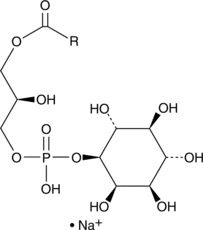Territorial Availability: Available through Bertin Technologies only in France
- Correlated keywords
- 796963-93-4 PLA-1 -2 ERK-1 -2 ERK2 ERK1 GPR-55 sn1 sn2 p-38 cattle
- Product Overview:
Lysophosphatidylinositols (LPIs) are bioactive lysophospholipids formed via phospholipase A1 (PLA1) or PLA2 catabolism of phosphatidylinositol (Item No. 24523).{43460} They are produced in a variety of cells including human platelets, endothelial cells, and neutrophils and are found in the central and peripheral nervous system.{43461} LPIs containing stearic acid (Item No. 10011298) are the primary form found in rat brain followed by LPIs containing arachidonic acid (Item Nos. 90010 | 10006607), and both are agonists of the G protein-coupled receptor GPR55, with 2-arachidonoyl LPI having higher activity than 2-stearoyl LPI.{43460} LPIs also induce exocytotic release of insulin by pancreatic islet cells and intracellular calcium mobilization in a variety of cells, as well as increase ERK1/2, Akt, and p38 phosphorylation via GPR55 activation.{43462,43461} LPIs accumulate in transformed cell lines due to increased PLA2 activity and blood levels are higher in patients with ovarian or peritoneal cancers compared with healthy controls.{43460,43461} Lysophosphatidylinositols is a mixture of lysophosphatidylinositols isolated from porcine liver with various fatty acyl groups at the sn-1 position and a hydroxy group in the sn-2 position.
Cayman Chemical’s mission is to help make research possible by supplying scientists worldwide with the basic research tools necessary for advancing human and animal health. Our utmost commitment to healthcare researchers is to offer the highest quality products with an affordable pricing policy.
Our scientists are experts in the synthesis, purification, and characterization of biochemicals ranging from small drug-like heterocycles to complex biolipids, fatty acids, and many others. We are also highly skilled in all aspects of assay and antibody development, protein expression, crystallization, and structure determination.
Over the past thirty years, Cayman developed a deep knowledge base in lipid biochemistry, including research involving the arachidonic acid cascade, inositol phosphates, and cannabinoids. This knowledge enabled the production of reagents of exceptional quality for cancer, oxidative injury, epigenetics, neuroscience, inflammation, metabolism, and many additional lines of research.
Our organic and analytical chemists specialize in the rapid development of manufacturing processes and analytical methods to carry out clinical and commercial GMP-API production. Pre-clinical drug discovery efforts are currently underway in the areas of bone restoration and repair, muscular dystrophy, oncology, and inflammation. A separate group of Ph.D.-level scientists are dedicated to offering Hit-to-Lead Discovery and Profiling Services for epigenetic targets. Our knowledgeable chemists can be contracted to perform complete sample analysis for analytes measured by the majority of our assays. We also offer a wide range of analytical services using LC-MS/MS, HPLC, GC, and many other techniques.
Accreditations
ISO/IEC 17025:2005
ISO Guide 34:2009
Cayman is a leader in the field of emerging drugs of abuse, providing high-purity Schedule I-V Controlled Substances to federally-licensed laboratories and qualified academic research institutions for forensic analyses. We are certified by ACLASS Accreditation Services with dual accreditation to ISO/IEC 17025:2005 and ISO Guide 34:2009.





